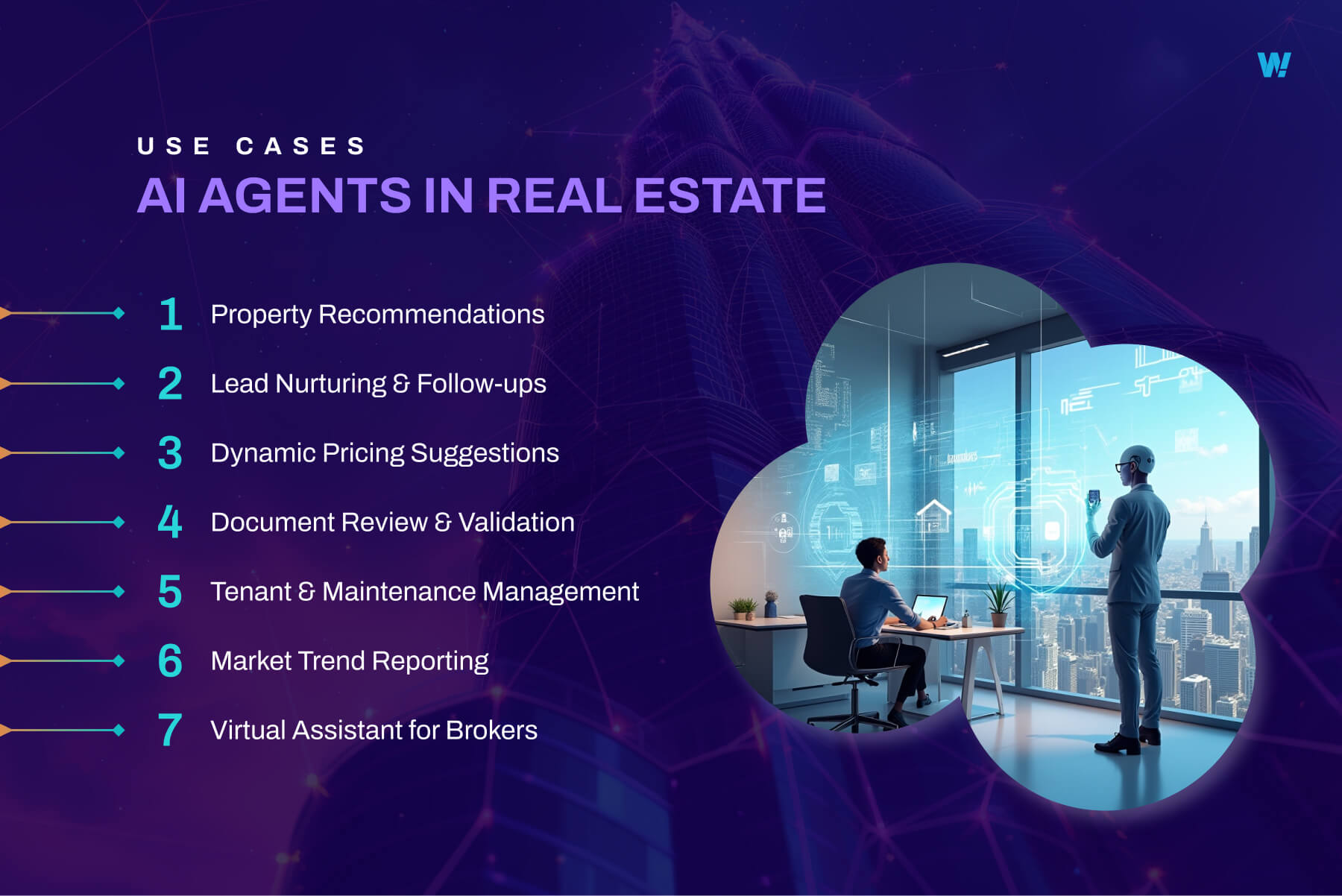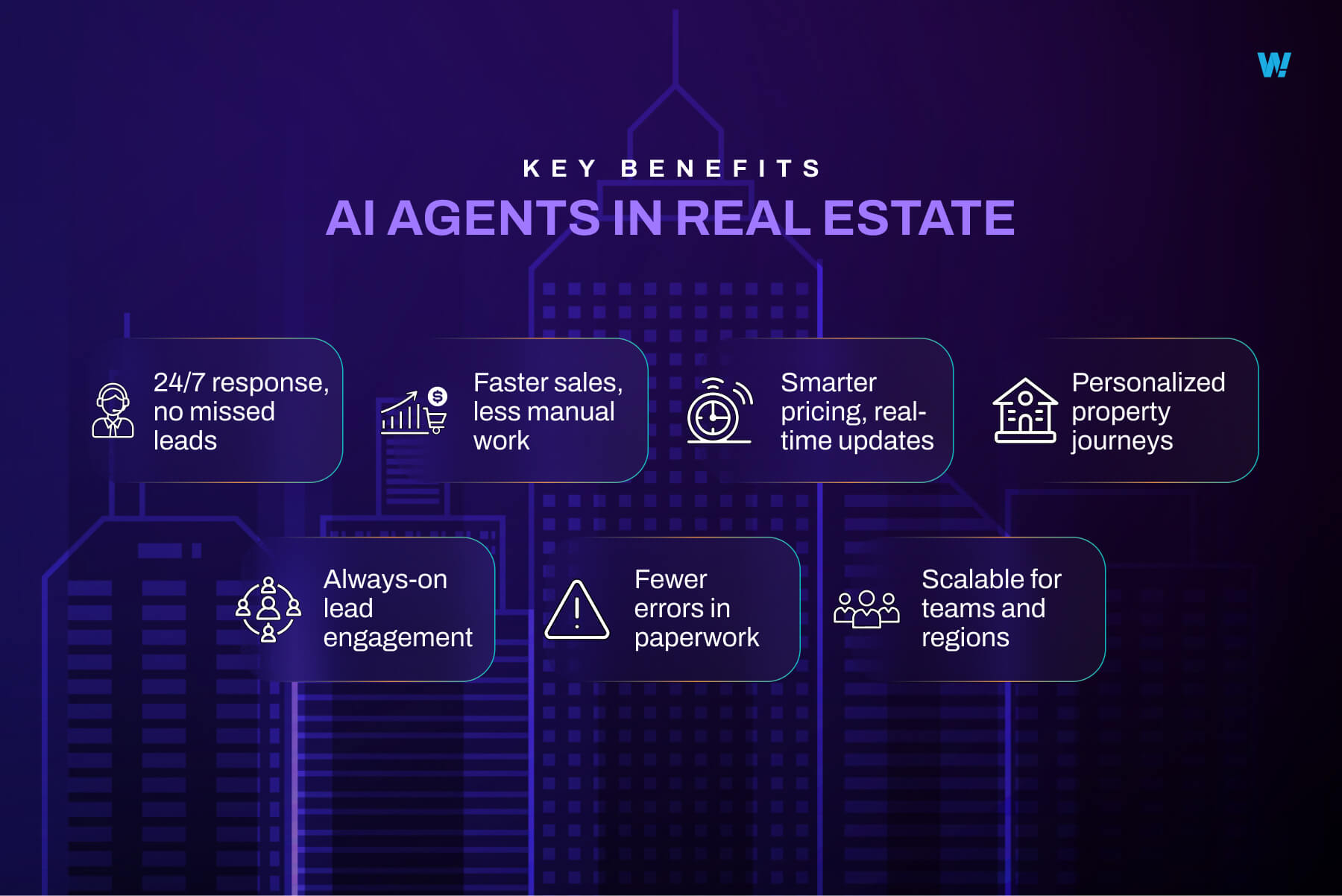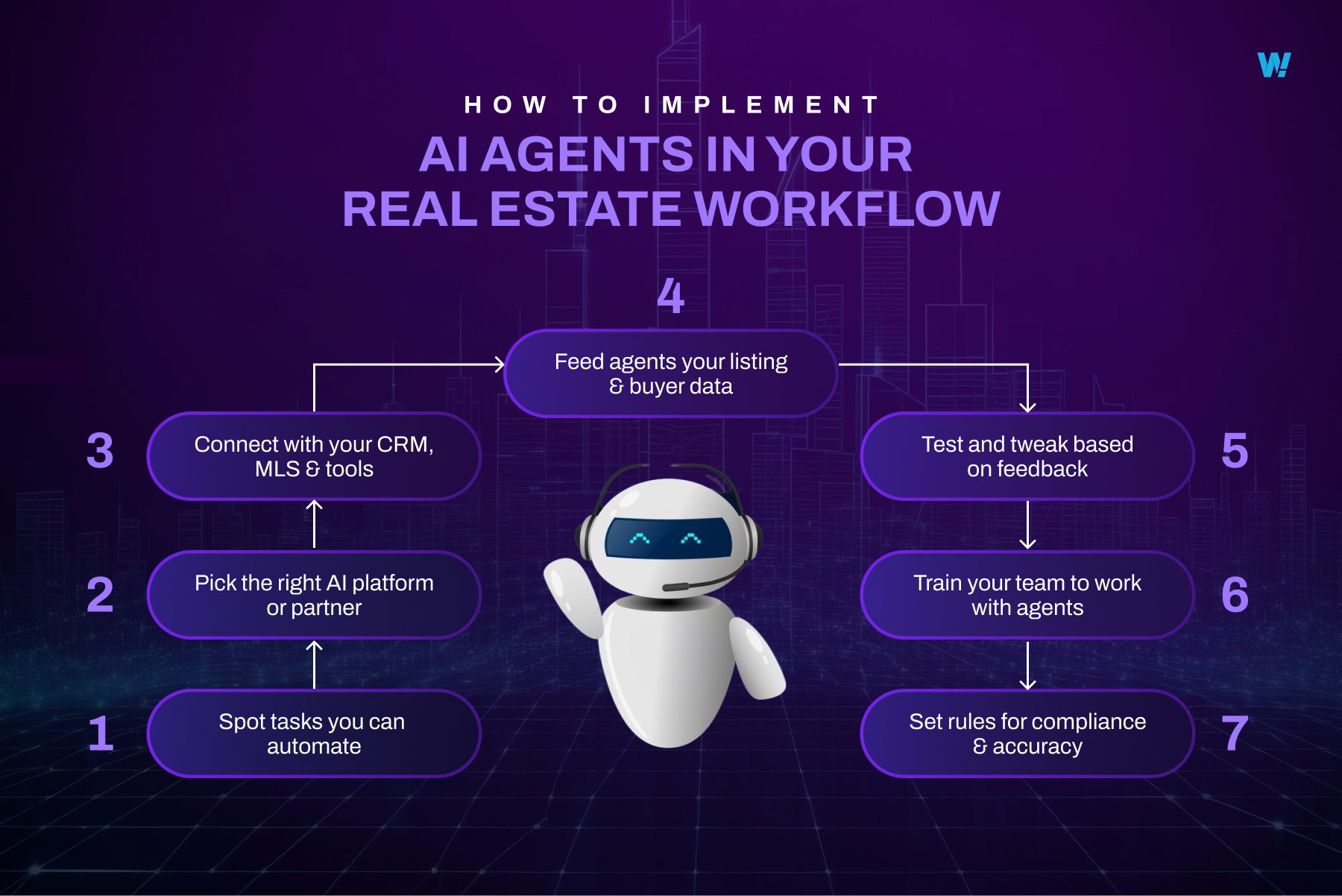The real estate industry is changing fast. At the heart of this change are AI agents in real estate. These agents are intelligent systems that can think, learn, and take action. From answering client inquiries to managing property listings and writing AI-generated property descriptions, they’re helping real estate professionals work smarter and faster.
Backed by artificial intelligence, these agents combine natural language processing, data analytics, and smart decision-making to support both real estate agents and property managers.
They can handle everything from creating virtual tours and interactive floor plans, to writing personalised listing descriptions, engaging on social media platforms, and even managing MLS listings.
And they’re not just for large firms. Even smaller real estate businesses, brokerages, and construction companies are adopting AI-powered tools to stay ahead. With features like instant replies, customisable templates, virtual staging, and automated follow-ups, an AI real estate agent helps close deals faster, attract more qualified leads, and deliver a better customer experience.
The numbers speak for themselves: the global AI real estate market was valued at USD 2.9 billion in 2024, and it’s expected to grow to USD 41.5 billion by 2033, at a CAGR of 30.5%. (The Business Research Company)
In the present day market, where market conditions change quickly and prospective buyers expect immediate responses, AI offers a clear competitive point. If you’re helping property owners, guiding buyers through the home buying process, or just trying to save time, AI assistants bring true value by reducing human error, speeding up tasks, and allowing human agents to focus on what matters most.
This blog explores how AI agents are making a strong impact the real estate market, the key use cases, benefits, and what you need to know before adding them to your workflow. If you’re focused on growing your real estate business, or offering a more modern experience, AI agents are quickly becoming the key feature of forward-thinking real estate teams.
What Are AI Agents in Real Estate Industry?
Understanding AI Agents
AI agents are smart software tools that can take actions on their own. They don’t just follow simple instructions, they can think through a goal, plan what to do, and act. In the real estate industry, these agents help by taking over repetitive or complex tasks that would normally need a human.
They use real-time data and advanced language models to make decisions, just like a person would. This helps them stay useful in different situations, whether it’s helping a client, managing property data, or keeping track of market trends.
How Are They Different from Traditional AI Tools?
Traditional AI tools are often rule-based. That means they only do what they’re told. For example, a chatbot might answer basic questions, but it can’t go beyond what it’s been programmed to do.
AI agents, on the other hand, are goal-driven. They can figure things out based on the situation. If a client wants to view a house, an AI agent could check the schedule, find available slots, and even send a confirmation, all without human help.
Know more about the differences between AI Agents and Chatbots.
Key Traits of AI Agents in Real Estate
AI agents working in real estate usually share a few key traits:
- Autonomy: They can act without being told every step.
- Goal-Oriented: They focus on getting a specific job done, like scheduling a visit or generating leads.
- Context-Aware: They understand the situation around them, such as local laws, market trends, or user behaviour.
Use Cases of AI Agents in Real Estate

a. Property Recommendations
Finding the right property is one of the biggest challenges for buyers and renters. AI agents make this easier by analysing:
- A buyer’s or tenant’s budget
- Preferred location
- Desired number of rooms and property size
- Lifestyle preferences (such as nearby schools or transport)
They study past searches, online behaviour, and local listings to offer tailored property suggestions—often in real time. This improves the customer experience and saves agents hours of manual work.
b. Lead Nurturing & Follow-ups
Many estate agencies lose potential clients due to delayed or missed follow-ups. AI agents help by:
- Sending regular emails or chat updates to leads
- Answering common questions instantly
- Tracking lead activity and responding accordingly
- Alerting human agents when a lead is ready to convert
These actions keep the conversation going, increasing the chance of closing a sale or rental.
c. Dynamic Pricing Suggestions
Setting the right price for a property is key. AI agents can provide dynamic pricing advice by analysing:
- Competitor property listings
- Area-specific demand
- Recent sale prices
- Seasonal trends
They offer real-time suggestions that help sellers and agents stay competitive and make informed pricing decisions.
d. Document Review & Validation
Property transactions involve many documents, which need to be accurate and complete. AI agents assist by:
- Reviewing lease agreements, sale contracts, and ID proofs
- Highlighting missing or incorrect information
- Checking for compliance with legal standards
- Speeding up the documentation process
This reduces the chances of human error and ensures a smoother closing experience.
e. Tenant & Maintenance Management
AI agents are useful in rental property management too. They can:
- Remind tenants about rent due dates
- Log and assign maintenance requests
- Keep records of past repairs
- Communicate with tenants automatically
This takes pressure off landlords and property managers while improving service for tenants.
f. Market Trend Reporting
Staying informed about the property market is important for both agents and investors. AI agents can generate reports by:
- Analysing price trends in specific areas
- Studying shifts in demand or supply
- Tracking emerging investment opportunities
- Summarising data in easy-to-read formats
These insights help professionals make timely and confident decisions.
g. Virtual Assistant for Brokers
Brokers handle many clients and tasks each day. AI agents act as smart assistants who can:
- Manage their calendar and appointments
- Send reminders for client meetings or tasks
- Prepare summaries of client preferences
- Handle basic communication when the broker is busy
This helps brokers stay organised, save time, and focus on building relationships
AI agents aren’t just useful in real estate, they’re also changing how support teams work. See how in our blog on AI for customer support.
Key Benefits of AI Agents in Real Estate

1. 24/7 Availability and Responsiveness
One of the biggest advantages of AI agents is that they are always active. Unlike human teams, they do not have working hours. They can answer questions, collect client information, and even send follow-up messages at any time of day or night. This helps real estate companies stay connected with potential clients without missing out on leads, even during weekends or holidays.
Key advantages:
- Quick replies at any time of day
- No missed leads due to slow responses
- Continuous support across time zones
2. Faster Deal Closures and Reduced Admin Burden
AI agents take on many time-consuming tasks such as sending emails, scheduling property visits, updating listings, and following up with clients. By handling these jobs, they give agents more time to focus on closing deals and working directly with clients. This leads to quicker decision-making and shorter sales cycles.
Key advantages:
- Less manual work for agents
- Faster movement from lead to deal
- More time for client-facing activities
3. Consistent Client Communication and Follow-ups
Keeping in touch with clients is important, but difficult to manage at scale. AI agents ensure no one is left waiting by sending regular updates, reminders, and replies. This consistent communication builds trust and keeps clients engaged throughout their property journey.
Key advantages:
- No gaps in communication
- Better client satisfaction
- Higher conversion from lead to sale or rent
4. Smarter Pricing with Real-Time Market Insights
AI agents can monitor market data in real time to suggest competitive prices for properties. They consider factors like local demand, recent sales, and competitor listings to help agents and sellers set the right price. This removes guesswork and allows for quicker, more confident pricing decisions.
Key advantages:
- Pricing based on real data
- Quicker adjustments to market changes
- Improved sales outcomes
5. Personalised Property Journeys
Every buyer or renter has different needs. AI agents can track what a person is looking for—such as location, price range, and type of home—and suggest properties that match. This personal approach improves the client experience and increases the chances of finding the right match faster.
Key advantages:
- Tailored recommendations
- A smoother property search experience
- Stronger relationships with clients
6. Fewer Errors in Paperwork and Transactions
Mistakes in contracts and legal documents can lead to delays and costly problems. AI agents can scan and review documents to catch missing information or errors before they cause issues. This ensures smoother and safer property transactions for both buyers and sellers.
Key advantages:
- Improved accuracy in documents
- Fewer delays during closing
- More professional, reliable service
7. Scalable Operations Across Teams and Locations
Whether you’re a small agency or a large real estate firm with multiple offices, AI agents can scale up easily. They can manage larger volumes of tasks without the need to hire more staff, making them ideal for growing businesses or those expanding into new regions.
Key advantages:
- Smooth handling of more leads and listings
- Consistent service across teams
- Easy expansion into new markets
How to Implement AI Real Estate Agents Workflow

1. Spot Tasks You Can Automate
Start by identifying the tasks that take up time but don’t need human judgment. These are ideal for AI agents. Think of jobs that are repetitive, follow a set process, or require quick responses.
Common examples:
- Following up with leads via email or chat
- Answering common buyer or tenant questions
- Updating listings or entering client data
- Sending appointment reminders
2. Choose the Right AI Platform or Partner
Not all AI tools are the same. Look for platforms or service providers who understand the real estate industry and can customise agents to fit your needs. Choose one that’s easy to use, supports integration, and offers clear support when needed.
Things to look for:
- Real estate-specific features
- Simple setup and good support
- Clear pricing and usage plans
3. Connect with Your CRM, MLS, and Other Tools
For AI agents to work well, they need access to the systems you already use—like your CRM, property database, or Multiple Listing Service (MLS). Integration helps the agent pull the right data and respond in the correct context.
Make sure to:
- Link your AI agent with your CRM system
- Sync it with your MLS and property tools
- Allow access to calendars, emails, and task managers
4. Feed Agents Your Listing and Buyer Data
AI agents learn and improve with good data. The more relevant information they have, the better they can respond, suggest properties, and make smart decisions. Be sure to include property details, buyer behaviour, and local market data.
Share data such as:
- Property listings with up-to-date details
- Client preferences and search history
- Area trends and pricing insights
5. Test and Tweak Based on Feedback
Once your agent is live, test how it works in real-world situations. Pay attention to how users respond, what questions are being asked, and where the agent struggles. Use this feedback to improve its performance.
Improve your setup by:
- Monitoring conversations and user actions
- Adjusting replies and task flows
- Making updates based on real feedback
6. Train Your Team to Work with AI Agents
AI agents are here to support—not replace—your team. Help your staff understand how to work alongside these agents. This includes when to step in, how to use the data they gather, and how to oversee their tasks.
Training should cover:
- When to let AI take over and when to step in
- How to monitor AI actions and fix issues
- Using agent reports to guide follow-ups
7. Set Rules for Compliance and Accuracy
Since AI agents handle sensitive data and make decisions, it’s important to set clear rules. This ensures they stay accurate, follow legal standards, and respect client privacy.
Important rules include:
- Data privacy and security guidelines
- Regular checks for errors or outdated info
- Clear limits on what the AI agent can and can’t do
Key Considerations Before Adopting AI Agents in Real Estate
1. Data Security and User Privacy
Real estate businesses often handle sensitive personal and financial information, such as ID proofs, income details, and legal documents. It’s essential to make sure your AI agents follow strong data protection practices.
What to consider:
- Is user data stored and shared securely?
- Does the system follow data privacy laws (like GDPR)?
- Are access controls in place to prevent misuse?
2. Custom vs. Off-the-Shelf AI Agents
You’ll need to decide whether to build a custom agent tailored to your business or use a ready-made solution. Each comes with pros and cons depending on your goals, budget, and internal tech capacity.
Ask yourself:
- Do you need specific features that off-the-shelf tools don’t offer?
- Can your team manage and maintain a custom-built agent?
- What’s your timeline and budget for setup?
3. Regulatory and Compliance Requirements
Different regions have different rules around how data can be used, stored, and shared in real estate transactions. Make sure your AI system follows local laws to avoid legal trouble.
Important checks:
- Are you meeting property data handling rules in your area?
- Is your AI agent trained to avoid biased or unfair responses?
- Are audit trails and logs available for review if needed?
4. Interoperability with Legacy Systems
Your business likely already uses tools like CRMs, MLS databases, and scheduling platforms. It’s important that your AI agent works well with these systems to avoid extra costs or disruptions.
Look for:
- Smooth integration with your existing tech stack
- Minimal changes required to current processes
- API support or plug-ins for older systems
5. Setting Realistic Goals and Measuring ROI
AI agents are powerful, but they’re not magic. Setting clear goals from the start—like reducing response times or improving lead follow-up—is key to seeing real benefits. Measuring results also helps you improve over time.
Plan ahead by asking:
- What specific tasks will the AI agent handle?
- How will you measure success (e.g. lead conversion, time saved)?
- What outcomes do you expect in the first 3 to 6 months?
Do You Want to Build Your Own AI Agent?
If you’re thinking about using AI agents in your real estate business, why not go a step further and build one that’s fully customised to your needs?
If it’s for lead generation, property recommendations, client support, or internal workflows, a custom AI agent can be trained to work the way you do, using your data, your tone, and your goals.
You don’t need to settle for generic tools. With the right partner, you can develop your own intelligent, goal-driven agent that grows with your business.
How Wow Labz Can Help You
At Agentic AI Labz by Wow Labz, we specialise in building custom AI agents that go beyond automation. Our team combines deep AI expertise with a strong understanding of real-world workflows to create solutions that are smart, scalable, and reliable.
We’ve worked with companies across sectors, helping them simplify complex tasks and transform the way they operate and our clients love the results. From small startups to fast-scaling enterprises, our clients trust us to build agents that deliver real impact.
Here’s what we bring to the table:
- A deep understanding of Agentic AI systems and autonomous workflows
- Hands-on experience in real estate, fintech, SaaS, and more
- End-to-end support from idea to deployment
- A growing list of happy clients who’ve seen results they can measure
If you’re ready to build an AI agent that truly fits your business, we’re ready to help. Let’s connect.






